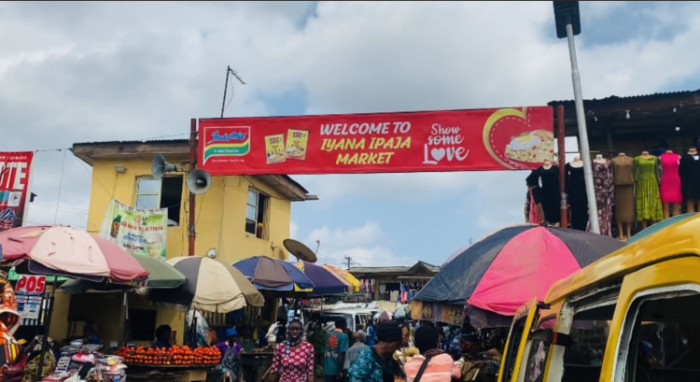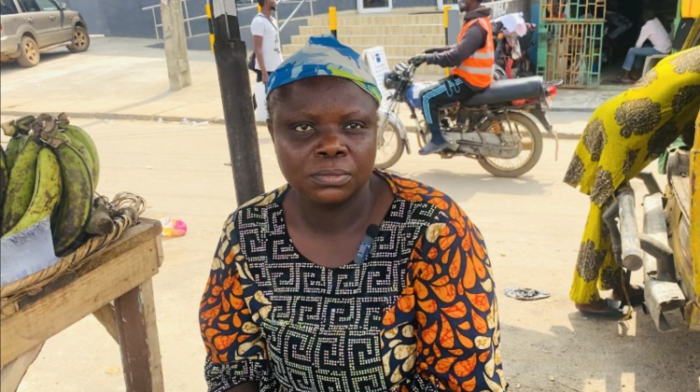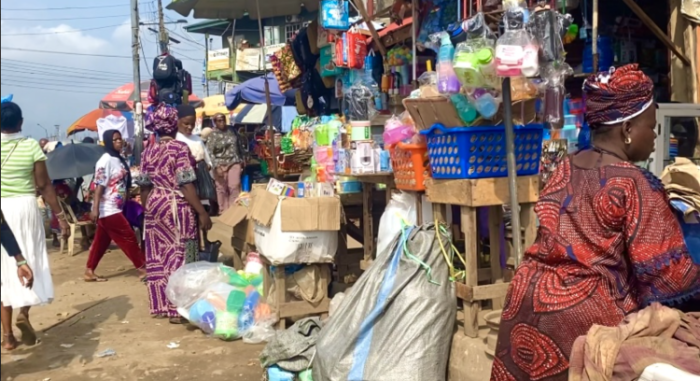In Iyana Ipaja, Lagos, market women are confronting extortion through protest, echoing the tactics of the Aba women of 1929 and the Egba women of 1947. Their defiance continues a long tradition of resistance in Nigeria — one that has won victories, but not always lasting ones.
Around the middle of last year, a group of women, numbering over ten, marched to the Alimosho Local Government Area (LGA) Secretariat in Lagos, southwest Nigeria, seeking an audience with Jelili Sulaimon, who headed the LGA as chairman at the time.
The women were traders from Iyana Ipaja, a bustling Lagos market crowded with foodstuffs, fabrics, and household goods. They had gathered at the LGA secretariat to petition Sulaimon for relief from touts who harassed and extorted them, seizing their wares and often destroying goods when the women resisted.
They believed their voices, united, offered the path to liberation. And they had come to the office with the authority to act.
Nigeria operates a three-tier system of government, comprising federal, state, and local levels. Under the constitution, local governments are charged with grassroots development. Markets fall under their jurisdiction, and traders are required to pay taxes and levies to them. These levies serve as a source of revenue for the local government and are used to fund services in areas such as sanitation, road repairs, and others.
However, there is no structured system for collection. Instead, groups of touts, acting as informal transport workers, commonly called “agbero,” are deployed by local governments or road transport unions to extract money from traders and commercial bus drivers. They often rely on force and intimidation to compel compliance. For drivers, refusal can mean damaged vehicles; for traders, the loss of their wares or even bodily harm.

On this particular day, the market women had had enough. Among them stood Mrs. Soyoye, a sachet water and egg seller in her thirties — slim, wiry, who trades by the roadside opposite the market.
After losing almost ₦140,000 the previous year to levies, she spoke out fiercely against paying the thugs who continually preyed on them.
But Sulaimon, the official they came to petition, was not in his office. Unheard and unrelieved, the women left the premises, vowing to return.
No smoke without a fire
When this reporter met Soyoye a year after she joined other market women to protest, she was sitting in her roadside stall, some metres away from the roundabout in Iyana Ipaja. To her left were bags of sachet water and eggs in a small transparent bucket. She watched absentmindedly as conductors who hung onto yellow and black buses called on intending passengers.
Although Soyoye only began selling at the spot five years ago, the market had always been part of her life. Her late mother was a trader in the same market, and from her, Soyoye learned its rhythms, including the fees that had to be paid, when they were due, and who collected them.
This was why, when in 2023, a group of men claiming to be acting on orders of one Ishola Ejigbadero, a man who has been alleged to claim ownership of the land in the area, began requesting money from her and other traders, she was stunned. Paying once was never enough. Like other roadside traders who couldn’t afford shops, she was squeezed for double, sometimes triple, levies.
As she recalled the endless demands, Soyoye fought back tears. She tried to hold her composure, but the tears betrayed her. Between sniffles she murmured, “Don’t mind my tears,” cutting herself short every now and then. The helplessness, she said, was why she stood with other women in protest.
Motunrayo Adeleye, another roadside trader, had learned to harden herself. She had survived multiple levies, but the burden still bit deep. That was why she too added her voice against Ejigbadero and his men.

“I have gotten used to it. But some people do complain because they don’t make many sales and have nothing to pay. When some people came from the other side demanding money, people complained that it was too much. I also joined my voice in complaining because no one can come to our aid but ourselves,” said Adeleye.
Sometime in 2024, Ejigbadero denied ordering thugs to harass and extort the market women, but the market women were still convinced he gave the orders. So they began holding meetings and discussing the best approach to tackle the menace.
During one of their meetings, someone suggested writing to the local council and seeking an audience with the chairman. The idea gained approval, and letters were dispatched. But the effort brought no change.
After writing a series of letters to the local council without a resolution, the Iyana Ipaja market women agreed among themselves to take to the streets.
Wielding the age-old stick of protest
In July 2024, Iyana Ipaja market women held placards and stormed the streets of Iyana Ipaja in their numbers to demand an end to the extortion and harassment they endured from the thugs who claimed to have been acting on orders from Ejigbadero.
Police operatives were also at the scene of the protest to ensure calm and a peaceful demonstration.
Some traders recalled that a parallel protest took place at the home of the Baale, the traditional ruler. But Soyoye said she and other women chose to march to the LGA secretariat to petition the chairman, but their effort went nowhere.
In the end, it was the Baale who brokered peace. “I was not around, but my fellow traders told me about it,” said roadside trader, Adeleye. “They protested in the morning and when I came in the afternoon, it had been resolved. It was peaceful and no one fought.”
According to Adeleye, the women appealed to the Baale because the agbero groups respect his authority and he controls the ticketing system. “He told them not to inconvenience us, and since then the boys who claimed to be Ejigbadero’s men have stopped coming,” she said.

“The matter has died down, and everything has gone back to normal. Ejigbadero and the union have resolved the issue, and there is no fight. There is peace. We are at peace and selling our wares,” a trader who introduced herself as Mojisola said.
Still, market life remains fragile. Despite their contribution to the local economy, many women traders see their meagre incomes eroded by repeated levies as the cost of doing business rises across the country.
Dr. Boge Faruq, a lecturer in History and International Studies at Lagos State University (LASU), links these movements to deeper pressures. In research published in July, he wrote that “dire poverty, extreme economic hardship, injustice, nepotism, and unequal opportunity… have always been the harbingers of revolutions across the world.”
He pointed to the Glorious Revolution in England, the French and American Revolutions, and more recent uprisings like the Iranian Revolution, the Arab Spring, and Egypt’s Facebook Revolution. In each of these, women were not bystanders but central actors.
The women of Iyana Ipaja fit that lineage. For generations, Nigerian market women have turned to protest to defend their livelihoods. In 1929, Nwanyeruwa led Aba women to resist colonial taxation. In 1947, Funmilayo Ransome-Kuti organised Egba women against unfair levies on traders. Today, Iyana Ipaja’s traders draw on that tradition. Their march forced a temporary reprieve — though, as Soyoye warns, the peace may yet prove provisional.
“The Baale and Ejigbadero boys have agreed on a sharing formula. We are only paying for one ticket issued by the Baale for now, but we don’t know what they might do tomorrow,” she said.
The role of the Baale
A Baale is a title for a traditional local leader in Yorubaland, often serving as the head of a specific community or a section of land.
Dr. Boge, who has also published extensive research on ethnic groups, explained in an interview with this reporter that the Baale was responsible for coordinating people in communities to ensure peace, security, harmony, and progress before the emergence of modern political systems. He added that they still hold such powers in modern-day Nigeria but have become limited.
“The traditional constitution has been taken over by the modern political system. This has affected the responsibility and functions of Baales,” he explained. Baales hold the position of “Oloja”, a title for those who control economic activities in Yoruba communities and see to the peaceful resolution of conflicts among disputing parties in markets.
Even after the emergence of modern political systems and governments, Baales still hold the same responsibilities, serving as arbiters of disputes, as in the case of the Iyana Ipaja market women. Boge, however, said the “residents can either choose to obey his verdict or neglect it and present the issue before a court.”
Commenting on the settlement of disputes between Iyana Ipaja market women and local thugs, he said some Baales manage to broker peace through charisma and connections, adding that while they wield cultural influence, they hold no legal authority.
Not all protests are successful
The protests against the group that claimed to have acted on orders from Ejigbadero are not the only protests Iyana Ipaja market women have held in recent years.
Two years before they staged that protest, they joined other women and residents from Aboru, a neighbouring community, to protest against the impassable conditions of their roads.

Two years later, little has changed. Aboru remains riddled with bad roads that flood during the rains, frustrating businesses and residents who rely on the road.
During a visit to the community, Abiola Omowunmi, a trader who has been living in the community since 2000, revealed that the roads have been in that state since she moved into the community.
“The roads have been terrible since I moved here in 2000,” said Omowunmi. “It is deadly when it rains. People used to drown in floods and lose their properties. One of my husband’s relatives died in it. The government repaired the canal but left the roads. They started repairs three years ago but never completed them.”
She added that the women in the community have teamed up with other residents to protest against the condition of the road, but it has yielded no results.
Not every protest delivers change — Aboru’s broken roads make that clear. But from Aba to Abeokuta to Iyana Ipaja, market women remind us that silence is never an option. Their victories may be fragile, their struggles unfinished, yet each protest carves a mark in the long fight for dignity and justice.
This report was produced and first published by Social Voices with support from the Solutions Journalism Network and the Hewlett Foundation, under the Reporting Gender Equity Fellowship, an initiative of Social Voices Media & Development Foundation






